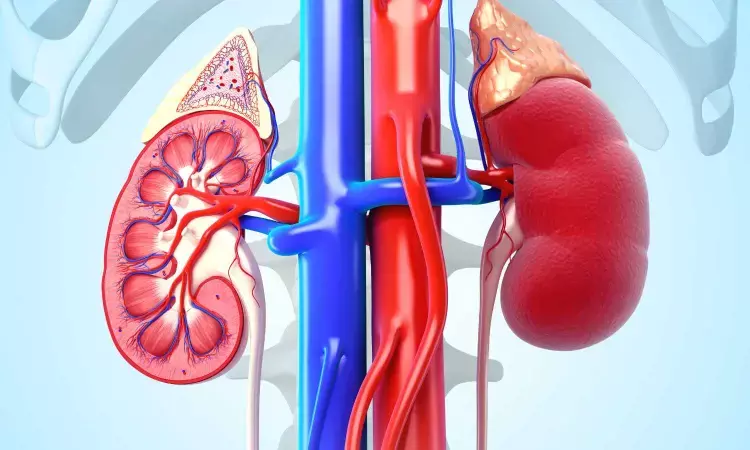- Home
- Medical news & Guidelines
- Anesthesiology
- Cardiology and CTVS
- Critical Care
- Dentistry
- Dermatology
- Diabetes and Endocrinology
- ENT
- Gastroenterology
- Medicine
- Nephrology
- Neurology
- Obstretics-Gynaecology
- Oncology
- Ophthalmology
- Orthopaedics
- Pediatrics-Neonatology
- Psychiatry
- Pulmonology
- Radiology
- Surgery
- Urology
- Laboratory Medicine
- Diet
- Nursing
- Paramedical
- Physiotherapy
- Health news
- Fact Check
- Bone Health Fact Check
- Brain Health Fact Check
- Cancer Related Fact Check
- Child Care Fact Check
- Dental and oral health fact check
- Diabetes and metabolic health fact check
- Diet and Nutrition Fact Check
- Eye and ENT Care Fact Check
- Fitness fact check
- Gut health fact check
- Heart health fact check
- Kidney health fact check
- Medical education fact check
- Men's health fact check
- Respiratory fact check
- Skin and hair care fact check
- Vaccine and Immunization fact check
- Women's health fact check
- AYUSH
- State News
- Andaman and Nicobar Islands
- Andhra Pradesh
- Arunachal Pradesh
- Assam
- Bihar
- Chandigarh
- Chattisgarh
- Dadra and Nagar Haveli
- Daman and Diu
- Delhi
- Goa
- Gujarat
- Haryana
- Himachal Pradesh
- Jammu & Kashmir
- Jharkhand
- Karnataka
- Kerala
- Ladakh
- Lakshadweep
- Madhya Pradesh
- Maharashtra
- Manipur
- Meghalaya
- Mizoram
- Nagaland
- Odisha
- Puducherry
- Punjab
- Rajasthan
- Sikkim
- Tamil Nadu
- Telangana
- Tripura
- Uttar Pradesh
- Uttrakhand
- West Bengal
- Medical Education
- Industry
Diabetes, Low eGFR Linked to Higher Risk of Death and Kidney Failure: Study

A population-based study of 618,739 adults using electronic health record data, published in the Clinical Journal of the American Society of Nephrology by Katherine R. Tuttle, Lindsey M. Kornowske, Cami R. Jones, Christina L. Reynolds, Radica Z. Alicic, Kenn B. Daratha, Joshua J. Neumiller, O. Kenrik Duru, Susanne B. Nicholas, Meda E. Pavkov, on behalf of the CURE-CKD Consortium, has found that people with diabetes and reduced estimated glomerular filtration rate (eGFR) faced significantly higher risks of mortality and kidney failure.
The study highlights how the coexistence of diabetes and impaired kidney function magnifies the risk burden, underscoring the importance of early recognition and proactive management in chronic kidney disease (CKD). The authors emphasize that protecting kidney and cardiovascular health requires an integrated and patient-centered approach, particularly for populations with overlapping metabolic and renal vulnerabilities.
The real-world cohort analysis examined outcomes in a large population across diverse clinical settings, making the findings highly relevant to everyday practice. Patients with both diabetes and reduced eGFR consistently showed the highest incidence of death and kidney failure compared to those without diabetes or with preserved renal function.
The results reflect the complex interplay between metabolic and renal pathways, where diabetes accelerates kidney injury, and impaired kidney function worsens cardiovascular and systemic risks. By leveraging real-world data, the study provides strong evidence that these patients represent a critical group requiring close monitoring, comprehensive care, and early interventions to prevent adverse outcomes.
The authors conclude that clinicians should adopt integrated models of care that address both renal and cardiovascular complications in patients with diabetes and CKD. This includes optimizing blood glucose control, monitoring renal function, managing blood pressure, and incorporating lifestyle modifications. The findings also call for healthcare systems to prioritize coordinated strategies that reduce fragmentation in CKD management. As diabetes continues to rise globally, and CKD remains a leading cause of morbidity and mortality, the study strengthens the case for preventive strategies and patient-centered care to reduce disease burden.
Dr. Shravani Dali has completed her BDS from Pravara institute of medical sciences, loni. Following which she extensively worked in the healthcare sector for 2+ years. She has been actively involved in writing blogs in field of health and wellness. Currently she is pursuing her Masters of public health-health administration from Tata institute of social sciences. She can be contacted at editorial@medicaldialogues.in.


